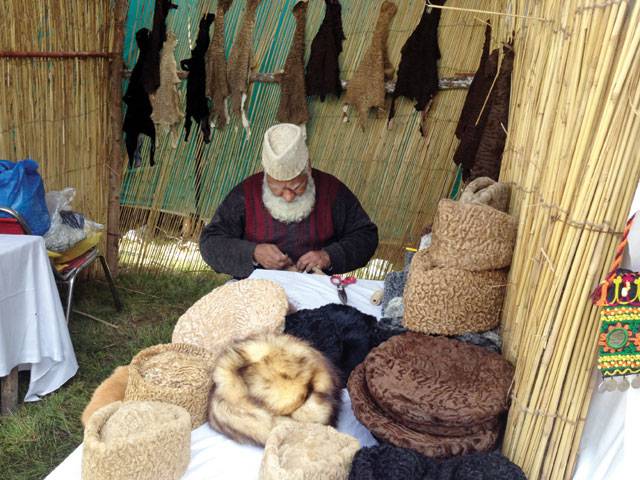Islamabad - “My father presented a Karakul cap to Jinnah Sahib during his visit to our shop in Qisakhwani Bazaar of Peshawar and in return he awarded my father with a certificate of honour for his craftsmanship,” said Sheikh Muhammad Khalil, 61, who has set up a stall selling Karakul caps at Khyber Pakhtunkhwa pavilion in Lok Virsa.
According to the craftsman, the art of Karakul, also known as Qaraqul, which he inherited from his forefathers, is in danger, as young generation is not taking interest in this skill. One of the reasons is the declining trend of wearing Karakul caps in Pakistan which was previously used by high officials and dignitaries. “I have the honour of making Karakul for Zulfiqar Ali Bhutto, Ziaul Haq, Qazi Hussain Ahmed, Maulana Abdul Baqi and many other high profile leaders,” added the artisan.
The trend of wearing Qaraqul has declined with the passage of time. “My grandfather Sheikh Maula Bux transferred the art to my father Sheikh Rahmat Ali and I learnt it from my father but my son is not interested in it, as the profession is no more rewarding.”
The Jinnah cap was popular till the mid-1980s and Peshawar was centre of Karakul business. According to Sheikh Muhammad Khalil, there were around 60 shops of karakul at Qissakhwani and Ghanta Ghar Bazaars of Peshawar city while at the moment there are only two shops and very few craftsmen are left in the city where the art has centuries-old history.
“When the remaining artisans are gone, the skill will goes with them,” he said and added “I don’t have any students at the moment; neither have I had some centre to teach students nor the youngsters are interested to learn this art.” Even he closed his own shop of Karakul and rented it out to another trader for some other business. “I could not afford to keep a shop for almost dying craft; at the moment if someone demands for Jinnah cap, I make it in my home,” he said.
The craftsman said that Jinnah cap is made of the karakul breed of sheep being imported from Afghanistan. The fur from which the cap is made has different names like “Astrakhan” and “qaraqulcha”. Muhammad Khalil has such a skill in this art that he can prepare a cap within an hour on demand. “I can make karakul within an hour; this is not time consuming skill but it needs experience.”
The real Karakul is an expensive product. An average cap is available at round Rs 7,000 but customers are not showing interest in buying Jinnah caps.
There are some artificial caps available in the market. According to Muhammad Khalil, in Afghanistan where the cap is called as Karzai cap, some high quality caps were sold from Rs 100,000 to Rs 225,000.
Friday, April 19, 2024
Art of making Jinnah cap dying

PTI founder’s interim bail extended in three cases
12:00 PM | April 19, 2024
US encourages Pakistan to prioritise and expand economic reforms
11:42 AM | April 19, 2024
Hafiz Naeem takes oath as JI chief, announces anti-government movement
11:39 AM | April 19, 2024
Faizabad commission report leaked, it should be made public now, suggests Abbasi
11:11 AM | April 19, 2024
A Tense Neighbourhood
April 19, 2024
Dubai Underwater
April 19, 2024
X Debate Continues
April 19, 2024
Hepatitis Challenge
April 18, 2024
IMF Predictions
April 18, 2024
Kite tragedy
April 19, 2024
Discipline dilemma
April 19, 2024
Urgent plea
April 19, 2024
Justice denied
April 18, 2024
AI dilemmas unveiled
April 18, 2024
ePaper - Nawaiwaqt
Advertisement
Nawaiwaqt Group | Copyright © 2024





